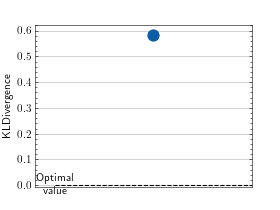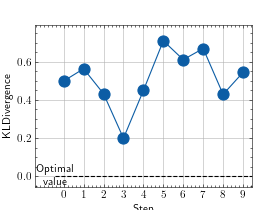KL Divergence¶
Module Interface¶
- class torchmetrics.KLDivergence(log_prob=False, reduction='mean', **kwargs)[source]¶
Compute the KL divergence.
\[D_{KL}(P||Q) = \sum_{x\in\mathcal{X}} P(x) \log\frac{P(x)}{Q{x}}\]Where \(P\) and \(Q\) are probability distributions where \(P\) usually represents a distribution over data and \(Q\) is often a prior or approximation of \(P\). It should be noted that the KL divergence is a non-symmetrical metric i.e. \(D_{KL}(P||Q) \neq D_{KL}(Q||P)\).
As input to
forwardandupdatethe metric accepts the following input:p(Tensor): a data distribution with shape(N, d)q(Tensor): prior or approximate distribution with shape(N, d)
As output of
forwardandcomputethe metric returns the following output:kl_divergence(Tensor): A tensor with the KL divergence
- Parameters:
log_prob¶ (
bool) – bool indicating if input is log-probabilities or probabilities. If given as probabilities, will normalize to make sure the distributes sum to 1.reduction¶ (
Literal['mean','sum','none',None]) –Determines how to reduce over the
N/batch dimension:'mean'[default]: Averages score across samples'sum': Sum score across samples'none'orNone: Returns score per sample
kwargs¶ (
Any) – Additional keyword arguments, see Advanced metric settings for more info.
- Raises:
TypeError – If
log_probis not anbool.ValueError – If
reductionis not one of'mean','sum','none'orNone.
Attention
Half precision is only support on GPU for this metric.
Example
>>> from torch import tensor >>> from torchmetrics.regression import KLDivergence >>> p = tensor([[0.36, 0.48, 0.16]]) >>> q = tensor([[1/3, 1/3, 1/3]]) >>> kl_divergence = KLDivergence() >>> kl_divergence(p, q) tensor(0.0853)
- plot(val=None, ax=None)[source]¶
Plot a single or multiple values from the metric.
- Parameters:
val¶ (
Union[Tensor,Sequence[Tensor],None]) – Either a single result from calling metric.forward or metric.compute or a list of these results. If no value is provided, will automatically call metric.compute and plot that result.ax¶ (
Optional[Axes]) – An matplotlib axis object. If provided will add plot to that axis
- Return type:
- Returns:
Figure and Axes object
- Raises:
ModuleNotFoundError – If matplotlib is not installed
>>> from torch import randn >>> # Example plotting a single value >>> from torchmetrics.regression import KLDivergence >>> metric = KLDivergence() >>> metric.update(randn(10,3).softmax(dim=-1), randn(10,3).softmax(dim=-1)) >>> fig_, ax_ = metric.plot()

>>> from torch import randn >>> # Example plotting multiple values >>> from torchmetrics.regression import KLDivergence >>> metric = KLDivergence() >>> values = [] >>> for _ in range(10): ... values.append(metric(randn(10,3).softmax(dim=-1), randn(10,3).softmax(dim=-1))) >>> fig, ax = metric.plot(values)

Functional Interface¶
- torchmetrics.functional.kl_divergence(p, q, log_prob=False, reduction='mean')[source]¶
Compute KL divergence.
\[D_{KL}(P||Q) = \sum_{x\in\mathcal{X}} P(x) \log\frac{P(x)}{Q{x}}\]Where \(P\) and \(Q\) are probability distributions where \(P\) usually represents a distribution over data and \(Q\) is often a prior or approximation of \(P\). It should be noted that the KL divergence is a non-symmetrical metric i.e. \(D_{KL}(P||Q) \neq D_{KL}(Q||P)\).
- Parameters:
q¶ (
Tensor) – prior or approximate distribution with shape[N, d]log_prob¶ (
bool) – bool indicating if input is log-probabilities or probabilities. If given as probabilities, will normalize to make sure the distributes sum to 1reduction¶ (
Literal['mean','sum','none',None]) –Determines how to reduce over the
N/batch dimension:'mean'[default]: Averages score across samples'sum': Sum score across samples'none'orNone: Returns score per sample
- Return type:
Example
>>> from torch import tensor >>> p = tensor([[0.36, 0.48, 0.16]]) >>> q = tensor([[1/3, 1/3, 1/3]]) >>> kl_divergence(p, q) tensor(0.0853)
